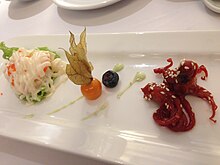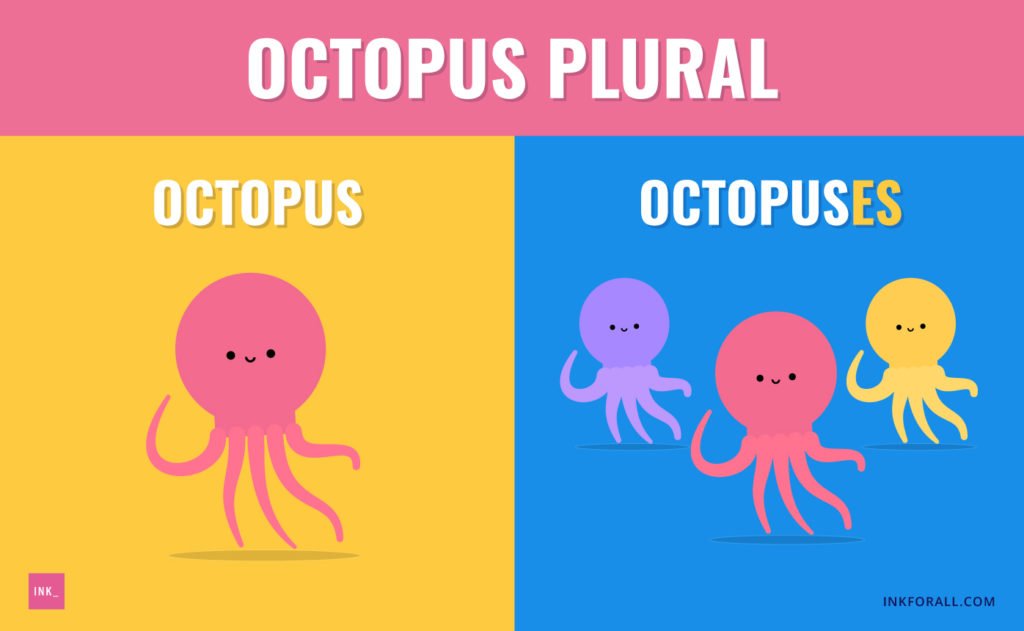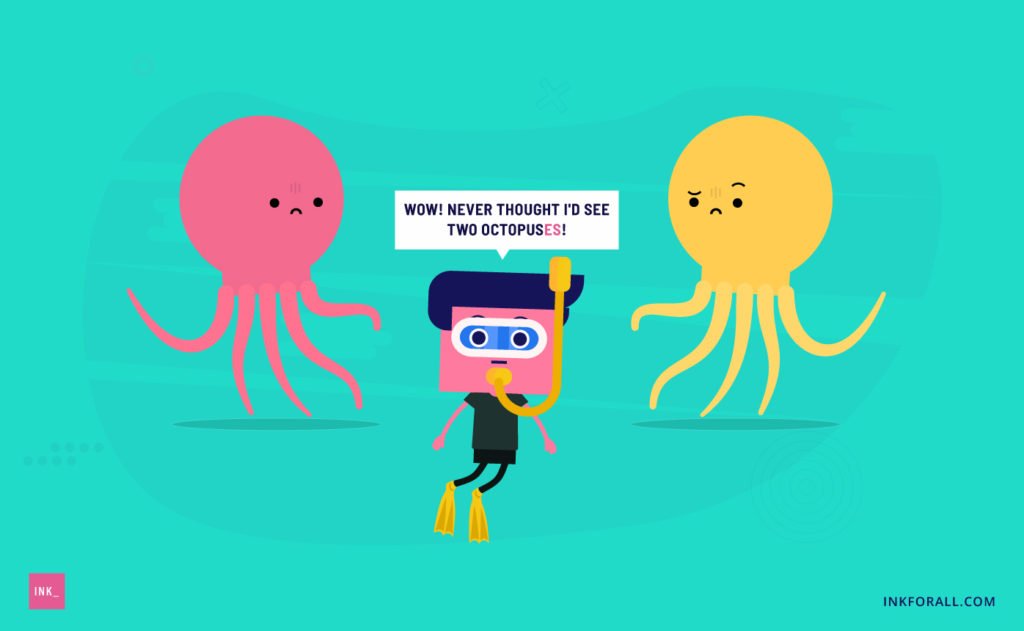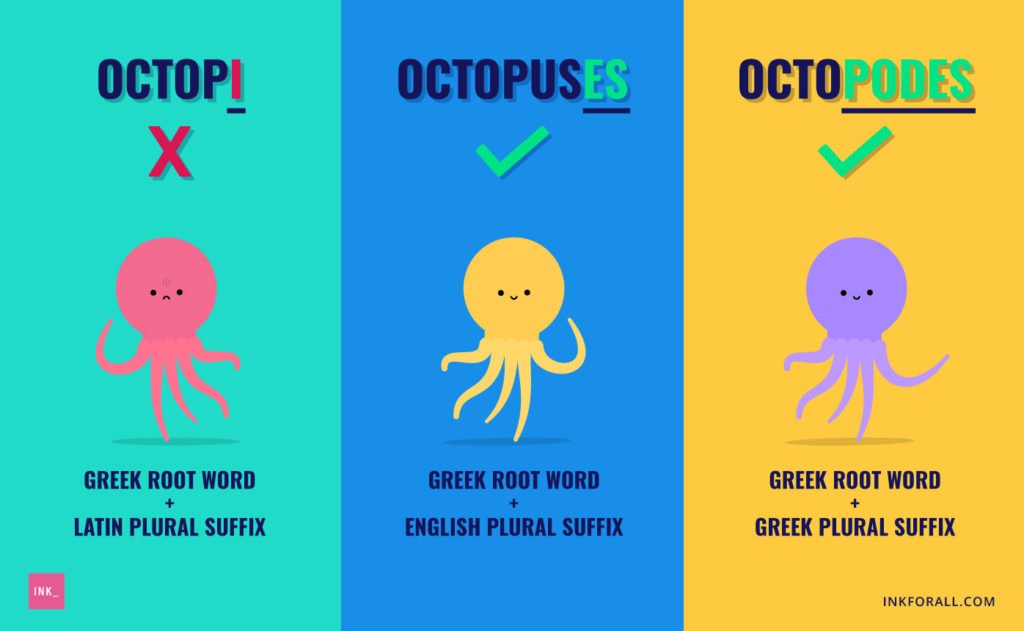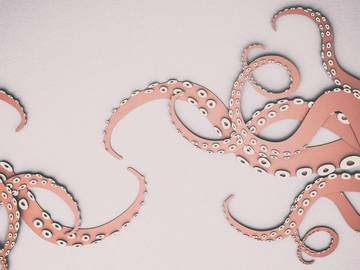English[edit]
Etymology[edit]
From Latin octōpūs, from Ancient Greek ὀκτώπους (oktṓpous), from ὀκτώ (oktṓ, “eight”) + πούς (poús, “foot”).
Pronunciation[edit]
- (Received Pronunciation) IPA(key): /ˈɒktəpʊs/, /ˈɒktəpəs/
- (General American) IPA(key): /ˈɑktəpʊs/, /ˈɑktəpəs/
Noun[edit]
octopus (plural octopuses or octopusses or octopi or octopodes or octopii) (see usage notes)
- Any of several marine molluscs of the family Octopodidae, having no internal or external protective shell or bone (unlike the nautilus, squid and cuttlefish) and eight arms each covered with suckers.
- (uncountable) The flesh of these marine molluscs eaten as food.
- An organization that has many powerful branches controlled from the centre.
Usage notes[edit]
- The plural octopi is hypercorrect, coming from the mistaken notion that the -us in octōpūs is a Latin second declension ending. The word is actually treated as a third declension noun in Latin. The plural octopodes (Latin: octōpodēs) follows the Ancient Greek plural, ὀκτώποδες (oktṓpodes). The plural octopii is based on an incorrect attempt to pluralise the word based on an incorrect assumption of its origin, and is rare and widely considered to be nonstandard.
- Sources differ on which plurals are acceptable: Fowler’s Modern English Usage asserts that “the only acceptable plural in English is octopuses”, while Merriam-Webster and other dictionaries accept octopi as a plural form. The Oxford English Dictionary lists octopuses, octopi, and octopodes (the order reflecting decreasing frequency of use), stating that the last form is rare. The online Oxford dictionary states that the standard plural is octopuses, that octopodes is still occasionally used, and that octopi is incorrect.
- The term octopod (both octopods and octopodes can be found as the plural) is taken from the taxonomic order Octopoda but has no classical equivalent, and is not necessarily synonymous (it can encompass any member of that order). The uncountable use of octopus is usually reserved for octopus flesh consumed for food («He ate too much octopus last night.»).
Synonyms[edit]
- polypus
Derived terms[edit]
- glass octopus (Vitreledonella richardi)
- octopean
- octopian
- octopic
- octopine
- octopod
- octopoid
- octopus hold
- octopus stretch
- octopuslike
- octopussy
Translations[edit]
mollusc
- ‘Are’are: kari
- Adyghe: псылъэхъу (psəlˢeχʷu)
- Afrikaans: seekat
- Aklanon: kugita
- Albanian: tetëkëmbësh (sq) m, oktapod (sq) m
- Alutiiq: amikuq
- Arabic: أُخْطُبُوط m (ʔuḵṭubūṭ)
- Egyptian Arabic: أَخْطَبُوط m (ʔuḵṭubūṭ)
- Hijazi Arabic: أَخْطَبُوط m (ʔaḵṭabūṭ)
- Moroccan Arabic: أَخْطَبُوط m (ʔuḵṭubūṭ)
- South Levantine Arabic: أَخْطَبُوط m (ʔuḵṭubūṭ)
- Armenian: ութոտնուկ (hy) (utʿotnuk)
- Asturian: pulpu (ast) m
- Azerbaijani: osminoq (az), oktapod, səkkizayaq
- Basque: olagarro
- Belarusian: васьміно́г m (vasʹminóh)
- Bengali: অক্টোপাস (bn) (okṭōpaś)
- Bislama: nawita
- Breton: morgazh m
- Brunei Malay: sutung
- Bulgarian: октопо́д (bg) m (oktopód)
- Burmese: ဘဝဲ (my) (bha.wai:)
- Catalan: pop (ca) m
- Cebuano: kugita
- Chechen: бархӏкогберг (barhkogberg)
- Cherokee: ᎠᏓᏢᎢ (adatlvi)
- Chinese:
- Cantonese: 八爪魚/八爪鱼 (baat3 zaau2 jyu4-2) (colloquial), 章魚/章鱼 (zoeng1 jyu4, zoeng1 jyu4-2)
- Mandarin: 章魚/章鱼 (zh) (zhāngyú)
- Min Nan: 章魚/章鱼 (chiuⁿ-hî, chiuⁿ-hû)
- Cornish: kollell-lesa f
- Czech: chobotnice (cs) f
- Danish: blæksprutte c
- Dutch: octopus (nl) m, inktvis (nl) m, kraak (nl) m
- Esperanto: polpo (eo)
- Estonian: seepia, tindikala, kaheksajalg
- Faroese: áttermdur, áttaermdur høgguslokkur
- Fijian: kuita
- Finnish: tursas (fi)
- French: pieuvre (fr) f, poulpe (fr) m
- Galician: polbo (gl) m
- Georgian: რვაფეხა (rvapexa)
- German: Tintenfisch (de) m (usual word; scientific for Coleoidea); Oktopus (de) m (chiefly scientific for the genus Octopus); Krake (de) m or f (scientific for Octopoda)
- Greek: χταπόδι (el) n (chtapódi)
- Ancient: πολύπους m (polúpous), ὀκτώπους m (oktṓpous)
- Haida: núugyaa
- Haitian Creole: pyèv
- Halkomelem: qéymeqw’
- Hawaiian: heʻe
- Hebrew: תמנון תְּמָנוּן (he) m (tmanún)
- Hindi: ऑक्टोपस m (ŏkṭopas), अष्टबाहु (aṣṭabāhu)
- Hungarian: polip (hu)
- Icelandic: kolkrabbi (is) m
- Ido: polpo (io)
- Ilocano: kurita
- Interlingua: octopode
- Inupiaq: nipitchaq
- Iranun: kurita’
- Irish: ochtapas (ga) m
- Italian: piovra (it) f, polpo (it) m, ottopode m
- Japanese: 蛸 (ja) (たこ, tako), 章魚 (ja) (たこ, tako), タコ (ja) (tako)
- Javanese: gurita
- Kannada: ಆಕ್ಟೊಪಸ್ಸು (kn) (ākṭopassu)
- Kazakh: сегізаяқ (segızaäq)
- Khmer: អដ្ឋករ (ʼatthaʼkɑɑ), រពីងសមុទ្រ (rɔpiing saʼmot)
- Korean: 문어(文魚) (ko) (muneo), 낙지 (ko) (nakji)
- Kurdish:
- Northern Kurdish: heştpê (ku), axtapot (ku), heştling (ku)
- Kyrgyz: сегиз бут (segiz but)
- Lao: ປາມຶກ (pā mưk) (cuttlefish, squid or octopus)
- Latin: polypūs m, octopūs m
- Latvian: astoņkājis (lv) m
- Lithuanian: aštuonkojis m
- Macedonian: октопо́д m (oktopód)
- Malagasy: horita (mg), orita (mg)
- Malay: gurita, kurita (ms), sotong gurita, doyak
- Brunei Malay: sutung
- Indonesian: gurita (id)
- Malayalam: നീരാളി (ml) (nīrāḷi)
- Maltese: qarnita f
- Mansaka: kogita
- Manx: oghtapus m, hoght-choshagh m
- Maori: wheke
- Maranao: kogita
- Mongolian:
- Cyrillic: наймалж (mn) (najmalž)
- Nauruan: dogiga (na)
- Navajo: łóóʼ bigaan tseebíí
- Neapolitan: purpo m
- Nepali: अक्टोपस (ne) (akṭopas)
- Nootka: tiiłuup
- Norman: pieuvre f (Jersey, Guernsey), pövr f (Sark)
- Norwegian:
- Bokmål: blekksprut m, akkar (no) m
- Nynorsk: blekksprut m, akkar m
- Occitan: pofre (oc) m
- Oriya: ଅକ୍ଟୋପସ (ôkṭopôsô)
- Orok: askuttu
- Ossetian: асткъахыг (astk’axyg)
- Ottoman Turkish: آختاپود (ahtapot)
- Palauan: bukitang, bokitang
- Persian: هشتپا (fa) (hašt-pâ), اختاپوس (fa) (oxtâpus)
- Polish: ośmiornica (pl) f
- Portuguese: polvo (pt) m
- Punjabi: ਤੰਦੂਆ (pa) (tandūā)
- Quechua: pulpu
- Rapa Nui: hehe
- Romanian: caracatiță (ro) f
- Russian: осьмино́г (ru) m (osʹminóg), спрут (ru) m (sprut) (large)
- Saanich: sqim̕ək̕ʷ
- Samoan: fe’e
- Santali: ᱚᱠᱴᱚᱯᱚᱥ (ôkṭôpôs)
- Sardinian: pruppu m (Campidanese)
- Scottish Gaelic: ochd-chasach m
- Serbo-Croatian:
- Cyrillic: хо̀ботница f, осмоног m
- Roman: hòbotnica (sh) f, osmonog m
- Seri: hapaj
- Sicilian: purpu (scn) m
- Sinhalese: බූවල්ලා (būwallā)
- Slovak: chobotnica (sk) f, osmonoh m
- Slovene: hobotnica (sl) f
- Somali: farammugo (so)
- Spanish: pulpo (es) m
- Sundanese: gurita
- Swahili: pweza (sw), pweza mkubwa
- Swedish: bläckfisk (sv) c
- Tagalog: pugita, salabay
- Tahitian: fee
- Tajik: ҳаштпо (haštpo)
- Tamil: சாக்குக்கணவாய் (ta) (cākkukkaṇavāy)
- Telugu: ఆక్టోపస్ (ākṭōpas)
- Thai: หมึกยักษ์ (mʉ̀k-yák)
- Tibetan: ཆུ་སྲིན་ལག་བརྒྱད (chu srin lag brgyad)
- Tok Pisin: urita
- Tongan: feke
- Turkish: ahtapot (tr)
- Turkmen: sekizaýak
- Ukrainian: восьмині́г m (vosʹmyníh), спрут m (sprut) (large)
- Urdu: آکٹوپس m (ākṭopas), ہَشْت پا (haśt-pā)
- Uyghur: سەككىز ئاياغ (sekkiz ayagh)
- Uzbek: sakkizoyoq (uz)
- Vietnamese: bạch tuộc (vi)
- Volapük: loktop, polüp (vo)
- Waray-Waray: kugita
- Welsh: octopws, nieidiol, wythgoes
- Yiddish: אָקטאָפּוס m (oktopus)
- Zazaki: ahtapot (diq) m, heştpa m
- Zulu: imbambela class 9/10, ingwane class 9/10
See also[edit]
- 🐙
- calamari
- cuttlefish
- Kraken
- nautilus
- squid
Verb[edit]
octopus (third-person singular simple present octopusses or octopuses, present participle octopussing or octopusing, simple past and past participle octopussed or octopused)
- To put (or attempt to put) one’s fingers, hands or arms in many things or places at roughly the same time.
-
1994, Susan Ketchin, The Christ-haunted Landscape:
-
He rises up on his wasted legs, the healer’s hands octopussed on his head.
-
-
2006, Stuart Lloyd, Gone Troppo: Hot Babes, Warm Weather, Cold Beer. Paradise!:
-
A skinny, sauced-looking gent in shorts and baseball cap wandered in through the door, his arms octopussing no less than three pre-teen girls.
-
-
2018, Derrick C. Brown, Hello. It Doesn’t Matter.:
-
I took off my shirt, standing in swim trunks, embarrassed of my tour body, my hands octopussing around the ashamed drink tickets of my gut.
-
-
- To spread out in long arms or legs in many directions.
-
1995, Donald A. Weatherby, The Star-Spangled Specter, page 105:
-
The bug-eyed press octopussed to their respective word processors.
-
-
1997, The Unesco Courier — Volume 50, Issues 1-6, page 33:
-
Dirt roads octopussed into the interior, where there were more dried mud and shrivelled crops.
-
-
2002, Susan Goyette, Lures: A Novel, page 224:
-
He had attached three more on so now there were seven legs octopussing out from underneath the chair.
-
-
2013, Jesse Hayworth, Jessica Andersen, Summer at Mustang Ridge:
-
The main house was a sprawling gray two-story structure with breezeways connecting it to the dining hall and another large wing, making it look like it had outgrown itself and octopused to the other spaces.
-
-
- To plug a large number of devices into a single electric outlet.
-
1963, Hardware Age — Volume 203, Issues 7-10, page 88:
-
If they’re all for a single indoor tree, caution against «octopusing» of cords from other cords, and the use of a number of cords in a single receptacle.
-
-
1985, Ted C. Williams, The Reservation, page 206:
-
By now, the reservation had electricity so THAT had to be octopussed out to the trailers too.
-
-
2010, Arthur Nersesian, Mesopotamia, page 53:
-
The three electrical outlets I could see—though located six feet above the ground, beyond all their little reaches—were octopussed with what looked like more plugs than the circuits could handle.
-
-
2011, Richard Sanders, Dead Heat, page 74:
-
It was an eight-channel audio recording snake, a bundled set of cables with eight plugs octopussing out of either end.
-
-
- (by extension) To grow in use vastly beyond what was originally intended.
-
1937, Fight Against War and Fascism — Volumes 5-6, page 34:
-
The interlocking business organizations have octopussed beyond all imagining in recent years; they are intermingled with citizens’ union-smashing committees and women’s strikebreaking “patriotic” groups, such as Neutral Thousands and Women of the Pacific.
-
-
1953, Dun’s Review and Modern Industry[1], volume 62, August-December 1953, page 256:
-
The busy man will do two things at once in his office; and with a little forethought he can practise what psychologist Freeman calls «brain octopussing» at home, too.
-
-
1978, William Edward Field, A Review of the Undergraduate Program in Agricultural Education at the University of Minnesota, 1977[2], page 349:
-
The course of study should be rooted in a survey of the needs of the community and not «octopussed» from swivel chair courses of study prepared for other areas.
-
-
1993, Mohammad Abdul Mannan, Growth and development of small enterprise, page 92:
-
The performance of it, however, did not improve, being octopussed by centuries-old not-to-move bureaucracy.
-
-
2000, Murray Bromberg, The Wagers of Sin, page 102:
-
Judging by the way that Boots was octopussing himself into the world of the stud farm and mastering the intricacies of thoroughbred financing, he was well on his way to raping Sport of Kings.
-
-
- To hunt and catch octopuses.
-
1956, Travel — Volume 105, page 46:
-
The sport could be called octopusing or octopus hunting— and any number may play. Supposing you catch an octopus, what do you have?
-
-
1977, Peter Howorth, Foraging Along the California Coast[3], Capra Press, →ISBN, page 97:
-
CRABBING AND OCTOPUSSING: Use the same method whether you skindive for crabs and octopi or gather them intertidally.
-
-
1993, Poyer Lin, NGATIK MASSACRE PB, page 163:
-
The municipal council assigned food quotas to each section and family contributions within sections. People spent the days before the visit fishing, octopusing, digging taro, cooking, and cleaning public spaces.
-
-
- To behave like an octopus.
-
1995, Donald A. Weatherby, The Star-Spangled Specter, page 77:
-
Night fell especially dark and cold for August, inky blackness tendrilling in, octopussing even the street lamps, now dim with vague form.
-
-
2009, Becky Citra, Whiteout, page 20:
-
“Strangled in the middle of the night by one of Molly’s eight legs.”
“Mo-om!” Molly kicked Robin in the shins.
“Owww!” Robin lunged against the door. “I’ve been octopused!”
-
-
2015, Natasha Pulley, The Watchmaker of Filigree Street:
-
It was quite a conincidence for a mechanical sea creature and he was speculating whether it could possibly have been done on purpose when Katsu stole his other sock and flopped on to the floor with an unbiological bang, whereupon it octopused out of the open door and slid down the banister.
-
-
Anagrams[edit]
- cop-outs, copouts, cops out
Dutch[edit]
Etymology[edit]
From Ancient Greek ὀκτώπους (oktṓpous), from ὀκτώ (oktṓ, “eight”) + πούς (poús, “foot”).
Pronunciation[edit]
- Hyphenation: oc‧to‧pus
Noun[edit]
octopus m (plural octopussen, diminutive octopusje n)
- octopus
Latin[edit]
Etymology[edit]
From Ancient Greek ὀκτώπους (oktṓpous, “eight feet”).
Pronunciation[edit]
- (Classical) IPA(key): /okˈtoː.puːs/, [ɔkˈt̪oːpuːs̠]
- (Ecclesiastical) IPA(key): /okˈto.pus/, [okˈt̪ɔːpus]
Noun[edit]
octōpūs m (genitive octōpodis); third declension
- (New Latin) octopus
-
1825, Willem de Haan, Monographiæ ammoniteorum et goniatiteorum specimen, page 10:
-
Jam vero testa in hac familia sola universalis pars est, Octopodis tantum exceptis.
- Now truly a shell is a part universal in this single family, octopus the notable exception.
-
-
Declension[edit]
Third-declension noun.
| Case | Singular | Plural |
|---|---|---|
| Nominative | octōpūs | octōpodēs |
| Genitive | octōpodis | octōpodum |
| Dative | octōpodī | octōpodibus |
| Accusative | octōpodem | octōpodēs |
| Ablative | octōpode | octōpodibus |
| Vocative | octōpūs | octōpodēs |
See also[edit]
- octipēs
Is it octopi or octopuses? That confusion ends now. We’ll dig into why octopuses is the correct plural of octopus. Does it sound weird? Sure. Are you slightly afraid to say it in polite company? Probably. But that doesn’t make it any less correct. We’ll also explain why the two irregular plurals for my favorite cephalopod even exist.
Main Octopus Plural Takeaways:
- The correct plural of octopus is octopuses.
- Irregular octopus plurals include octopi and octopodes. These may be acceptable in some dictionaries, but octopuses is always correct.
- Octopi follows Latin rules for making words plural but octopodes follows Greek pluralization rules.
- This is because octopus is actually a Latinized Greek word, which accounts for a lot of the octopus plural confusion.
What is the Correct Plural of Octopus?
The correct plural of octopus is octopuses. Although this word has ancient Latin and Greek roots, it’s an English word that follows normal English pluralization rules for words ending in “s.” There are technically three octopus plurals: octopi, octopodes, and octopuses. The first two come from Latin and Greek respectively, both of which are tied to the origins of the word octopus. The last option, octopuses, is the preferred pluralization in English.
So, can you say octopuses or is that even a word? Yes, and yes. That’s because it follows grammar rules suggesting that nouns ending in -s switch to an -es ending when pluralized.
Other similar plurals include:
- Gas becomes gases
- Bus becomes buses
- Lens becomes lenses
- Grass becomes grasses
- Loss becomes losses
(As with practically all things in English grammar, there are some exceptions to this rule.)
Why is it Octopuses and not Octopi?
Grammatically speaking, the correct plural form of the word octopus is octopuses. According to the Merriam-Webster dictionary, the term octopi was formed based on the belief that Latin singular words ending in ‘us’ must end in the letter ‘i’ (e.g. fungus-fungi, stimulus-stimuli, cactus-cacti).
Technically speaking, octopus is of Greek origin, not Latin. But, it was in the New Latin language before being introduced to English. So, following octopus’s origin, some people would argue that its correct plural form should be octopodes (Greek) and not octopi.
But, if you are to choose between octopi or octopuses, always choose octopuses. Notwithstanding octopus’s ancient roots, it is technically a modern English word. Meaning, it must follow English pluralization rules.
Is Octopus Latin or Greek?
The word octopus is both Latin and Greek. In fact, it’s technically a Latinized form of a Greek word to describe a creature with eight legs (ὀκτώ or okto, meaning eight + πούς or pous, meaning foot). The word was then Latinized to form octopus.
❓ Why 3 Octopus Plurals Exist:
- Some experts felt the plural of octopus should match the word’s origins.
- The problem is that octopus has both Greek and Latin roots. How do you choose which convention to follow?
- Since the modern word is English, we follow English pluralization rules. Therefore, octopuses is the most correct option.
What is the Irregular Plural for Octopus?
The correct plural of octopus is octopuses, but irregular plural forms for octopus are octopi and octopodes. These irregular octopus plurals come from the word’s Latin and Greek roots. For example, our modern English word octopus comes from ancient Greek roots that describe a creature with eight legs (ὀκτώ or okto, meaning eight + πούς or pous, meaning foot). The word was then Latinized to form octopus. As such, octopodes follows Greek pluralization rules. Conversely, octopi follows Latin pluralization rules.
These odes to the word’s ancient roots in the form of irregular octopus plurals are understandable. And, even interesting.
However, at the end of the day, octopus is now an English word. As such, it follows English grammar rules.
🐙 Greek Origins of the Word Octopus:
- ὀκτώ = okto = eight
- πούς = pous = foot
- ὀκτώπούς (oktopous) ➡️ octopus
While octopuses would be the assumed plural, some people use octopi or octopodes. Both of those are correct but highly irregular. These outliers can cause writers of all ages to have absolute fits. Just when you think you’ve got the hang of the English language, it throws a curveball. Some examples of irregular plurals are aircraft/aircraft (instead of aircrafts) and antenna/antennae (instead of antennas). And yes, octopus is included in that group too!
📝 An irregular plural is a plural that doesn’t conform to the grammatical standard.
What is the Name for a Group of Octopuses?
The most widely accepted name for a group of octopuses is a consortium. Other terms include tangle or clutch, but clutch is actually only proper when referring to a group of octopus eggs. It’s important to note that octopuses are usually solitary creatures that prefer to live alone. For this reason, there really isn’t an established name for a group of octopuses on the same level as a herd of cattle or murder or crows.
📝 The word octopus first appeared in 1758 in reference to the many-armed mollusks you find in the sea.
When did Octopi Become Octopuses?
Because ‘octopi‘ is a plural based on Latin grammar rules, you’d be forgiven for thinking it predates the plural octopuses. You would not, however, be correct. In reality, the English language adopted the word octopus in the mid-1700s. Because English nouns ending in -s are switched to -es when made plural, octopus became octopuses. It wasn’t until the 1900s that grammarians looked at the Latinized Greek origins of octopus and decided the plural of octopus should be octopi instead.
Octopus Plural Timeline:
- 1750s: The word octopus enters the English language. As such, the plural of octopus follows English grammar rules (octopus; octopuses).
- 1900s: Victorian-era grammarians argue that since the word octopus comes from Latinized Greek, it should follow Latin grammar rules for plurals. As a result, the irregular plural octopi starts to appear in some dictionaries.
Let’s see how Well you Know Octopus Plural in the Quiz Below
Octopus Plural Question #1
A. Octopi
B. Octopodes
C. Octopuses
D. All of the above
Correct!
Wrong!
The answer is D. All of these are acceptable ways to spell the plural for octopus.
Octopi or Octopuses Question #2
A. Octopi
B. Octopodes
C. Octopuses
D. All of the above
Correct!
Wrong!
The answer is C. Grammar rules suggest that nouns ending in “-s” switch to an “-es” ending when pluralized.
Plural of Octopus Question #3
Correct!
Wrong!
The answer is TRUE. That’s why some grammar experts argue that the plural form should follow Latin grammar rules (octopi).
Octopus Plural Question #4
A. Clutch
B. Ambush
C. School
D. Consortium
Correct!
Wrong!
The answer is D. “Clutch” is only acceptable when referring to a group of octopus eggs.
Octopus Plural Question #5
Correct!
Wrong!
The answer is FALSE. The word “octopus” first appeared in 1758 to describe many-armed mollusks you find in the sea.
Octopus Plural Quiz Result
Expert!
Not bad!
Almost got it! Review the article and try again.
Read More: Possum vs. Opossum: Definitely Different Animals
-
1
octopus
English-Russian dictionary of biology and biotechnology > octopus
-
2
octopus
Англо-русский словарь Мюллера > octopus
-
3
octopus
Персональный Сократ > octopus
-
4
octopus
1. n осьминог, спрут
2. n восьминогое животное
English-Russian base dictionary > octopus
-
5
octopus
Большой англо-русский и русско-английский словарь > octopus
-
6
octopus
[‘ɒktəpəs]
1) Общая лексика: восьминогое животное , осьминог, спрут, что-л. напоминающее спрута, осьминога
6) Подводное плавание: запасной лёгочник с дюритом, аварийный дыхательный автомат
Универсальный англо-русский словарь > octopus
-
7
octopus
English-russian biological dictionary > octopus
-
8
octopus
Англо-русский синонимический словарь > octopus
-
9
octopus
[‘ɔktəpəs]
2) спрут, нечто разветвлённое, запутанное
Англо-русский современный словарь > octopus
-
10
octopus
[ˈɔktəpəs]
octopus осьминог, спрут
English-Russian short dictionary > octopus
-
11
octopus
[ʹɒktə|pəs]
(pl -podes, -pi, -puses [-{ʹɒktə}pəsız]
1. осьминог, спрут
2. (любое) восьминогое животное
3. что-л. напоминающее спрута, осьминога ()
НБАРС > octopus
-
12
octopus
English-Russian dictionary of geology > octopus
-
13
octopus
[`ɔktəpəs]
осьминог, спрут
Англо-русский большой универсальный переводческий словарь > octopus
-
14
octopus
English-Russian sports dictionary > octopus
-
15
octopus
noun
осьминог, спрут
* * *
1 (0) осьминог
* * *
осьминог, спрут
* * *
[oc·to·pus || ‘ɑktəpəs /’ɒk-]
осьминог, спрут* * *
* * *
осьминог, спрут
Новый англо-русский словарь > octopus
-
16
octopus
Англо-русский словарь по пищевой промышленности > octopus
-
17
octopus
English-Russian dictionary of modern telecommunications > octopus
-
18
octopus
English-Russian dictionary of technical terms > octopus
-
19
octopus
English-Russian dictionary restaurant vocabulary > octopus
-
20
octopus
The Americanisms. English-Russian dictionary. > octopus
Страницы
- Следующая →
- 1
- 2
- 3
- 4
- 5
- 6
- 7
См. также в других словарях:
-
Octopus — Pour les articles homonymes, voir Octopus (homonymie) … Wikipédia en Français
-
Octopus — bimaculoides … Википедия
-
Octopus — oder Oktopus bezeichnet: Octopus (Gattung), eine Gattung aus der Ordnung der Kraken speziell die Krakenart Gewöhnlicher Krake Octopus (Telefonanlage), eine Familie mittlerer und großer TK Anlagen der Deutschen Telekom Octopus (Yacht), die Mega… … Deutsch Wikipedia
-
Octopus — Oc to*pus, n. [NL. See {Octopod}.] 1. (Zo[ o]l.) A genus of eight armed cephalopods, including numerous species, some of them of large size. See {Devilfish}. [1913 Webster] 2. (Zo[ o]l.) Any member of the genus {Octopus}. [PJC] 3. (Fig.)… … The Collaborative International Dictionary of English
-
octopus — ► NOUN (pl. octopuses) ▪ a mollusc with eight sucker bearing arms, a soft body, beak like jaws, and no internal shell. DERIVATIVES octopoid adjective. USAGE The standard plural in English of octopus is octopuses. However, since the word comes… … English terms dictionary
-
octopus — [äk′tə pəs, äk′təpoos] n. pl. octopuses, octopi [äk′təpī΄] octopodes [äk täp′ə dēz΄] [ModL < Gr oktōpous, eight footed < oktō,EIGHT + pous (gen. podos), FOOT] 1. any of various octopods (order Octopoda) having a soft, saclike body, a… … English World dictionary
-
Octŏpus — (Polyp), Gattung der achtfüßigen Kopffüßler, mit kugeligem Leibe ohne Schale u. acht gleichartigen Armen, mit zwei Reihen Saugnäpfchen; große sepienartige Thiere des Meeres, welche sich von allerlei Seethieren nähren; Art: Gemeiner Polyp (O.… … Pierer’s Universal-Lexikon
-
Octŏpus — (»Achtfuß«) s. Tintenschnecken … Meyers Großes Konversations-Lexikon
-
octopus — (n.) 1758, genus name of a type of eight armed cephalopod mollusks, from Gk. oktopous, lit. eight footed, from okto eight (see EIGHT (Cf. eight)) + pous foot (see FOOT (Cf. foot) (n.)). Proper plural is octopodes, though octopuses probably works… … Etymology dictionary
-
octopus — has the plural form octopuses. The pseudo Latin form octopi, except when used jocularly, is misconceived, since the Greek stem is octopod (giving the rightly rejected form octopodes in English) … Modern English usage
-
Octopus — This article is about the order of cephalopod. For other uses, see Octopus (disambiguation). Octopus … Wikipedia
The three plurals for octopus come from the different ways the English language adopts plurals. Octopi is the oldest plural of octopus, coming from the belief that words of Latin origin should have Latin endings. Octopuses was the next plural, giving the word an English ending to match its adoption as an English word. Lastly, octopodes stemmed from the belief that because octopus is originally Greek, it should have a Greek ending.
There are many ways that English manages to trip up its speakers, both native and non-native. One of the most effective of these is a method of pluralization that generally follows a set of rules, but occasionally behaves unpredictably.
Our language takes words from a wide variety of sources; generally when a noun enters into English it is pluralized as an English word, rather than in its native form. However, sometimes words will come into English and keep an ending from their original language, particularly if that original language is Latin. Thus, the plural of bacterium is bacteria, rather than bacteriums. And just to keep people on their toes, certain words of Latin extraction may be pluralized with either English or Latin endings: multiple stadium may be either stadia or stadiums.
Rule of thumb: if English gets the opportunity to trip you up, it will.
The current champion in the Battle of Troublesome Pluralization is octopus, which, depending on which dictionary is consulted, may be written in three different ways: octopi, octopuses, and octopodes. Such a range of options might prompt even the most patient learner of the language to say «what the hell? C’mon, English, get your act together.» This state of affairs is not so much the fault of the English language as it is of the people who speak it, who have been debating the proper way to pluralize octopus for a very long time. An article from over 140 years ago, «Octopus Philology» (titled in the clickbait of that era) offers three possibilities, admittedly sneering at two of them:
But as the Octopus grew and multiplied, it became necessary to speak of him in the plural; and here a whole host of difficulties arose. Some daring spirits with little Latin and less Greek, rushed upon octopi; as for octopuses, a man would as soon think of swallowing one of the animals thus described as pronounce such a word at a respectable tea-table. In this condition of affairs, we are glad to know that a few resolute people have begun to talk about Octopods, which is, of course, the nearest English approach to the proper plural.
— The Bradford Observer (West Yorkshire, Eng.), 7 Nov. 1873
Given that most people don’t often encounter multiple specimens of this genus of cephalopod mollusks it is unlikely that you will ever find yourself in sudden need of deciding which plural form is correct. But it is always better to be prepared with your irregular faux-classical plurals—good life advice in general, really—so here is a brief explanation of your choices.
Latin Endings for Latin Words
Octopi appears to be the oldest of the three main plurals, dating back to the early 19th century. The -i ending comes from the belief that words of Latin origin should have Latin ending in English (while octopus may ultimately come from Greek it had a stay in New Latin before arriving here).
BESEIGED BY DEVILFISH. How Octopi Took Possession Of Schooner. Incident of a Voyage in the Banda Sea—An Octopus Who Is Injured by a Sailor Calls Upon His Companions for Help—They Respond Promptly, and a Gang of Octopi Take Control of the Deck of the Vessel, Driving the Crew Below.
— (headline and caption) Chicago Daily Tribune, 15 Jan. 1888It is certain that the octopi do attain to a very large size in the Indian seas; and there is nothing improbable in their taking hold of a man and drowning him.
— Penny Magazine for the Diffusion of Useful Knowledge (London, Eng.), 23 Aug. 1834
English Endings for English Words
Octopuses (which may rarely also be found rendered as octopusses) dates from slightly later in the 19th century, and is based not so much on a belief as it is on the habit of giving English words English endings. While it may sound peculiar to some there is nothing incorrect about this formation. When octopus is used in a figurative sense («something that resembles an octopus especially in having many centrally directed branches») this seems to be the preferred plural.
The Standard Oil Company, says the Louisville Courier-Journal, is one of the great octopuses of time, absorbing everything that comes within its reach, and quite killing off everything in its own line of business in the way of competition.
—
Macon Telegraph (Macon, GA), 24 Jun. 1880. 2015He meandered on for fifty minutes in a long and rambling tirade … adorned with gloomy forebodings of a time near at hand when he, together with all the other horny-handed sons of toil (by the way his hands were very nice and white) would be enslaved, and education denied their children by those «octopuses,» the «millionaires.»
— The Arkansas Gazette (Little Rock, AR), 20 Oct. 1886
Greek Endings for Greek Words
The rarest of the three, octopodes came into possession of its ending from the belief some people had that this is a Greek word and should have a Greek ending (and also from the belief that there is no word which cannot be improved by making it less comprehensible).
It appears that the keeper, whilst engaged in cleaning out the tank occupied by the octopodes, was suddenly seized by the leg (fortunately he had sea boots on) by the largest of the octopodes, which fastened four of his tentacles round the leg of the boot, and with the other four held firmly on to the rocks forming the back of the tank.
— The North-Eastern Gazette (Middlesbrough, Eng.), 5 Sept. 1879There will be no huge tanks filled with mere «show» monsters—wallowing porpoises and cherub-like turtles and grim octopodes.
— The Daily Telegraph (London, Eng.) 16 Apr. 1873
All three of these have been criticized in the past, some more than others. If you’re interested in choosing the word that is most likely to be considered correct and understandable by your audience you would do well to opt for either octopuses or octopi. Octopodes, it should be noted, takes a slightly different pronunciation than the other two words, placing the emphasis on the second syllable, rather than the first. It more or less rhymes, appropriately enough, with «don’t say that please.»
MORE PLURALS: A Drudge of Lexicographers Presents: Collective Nouns
осьминог, спрут
существительное
- осьминог, спрут
- (любое) восьминогое животное
- что-л. напоминающее спрута, осьминога (разветвлённостью, действиями в политике и т. п.)
Мои примеры
Словосочетания
administrative octopus — административный спрут 
canned octopus — консервы из осьминога 
common octopus — обыкновенный осьминог 
marinaded octopus — маринованный осьминог 
dried octopus — сушеный осьминог 
octopus duct system — разветвлённая система воздуховодов с распределительным коллектором 
reef octopus — рифовый осьминог 
white spotted octopus — белопятнистый осьминог 
Примеры с переводом
The octopus grasps things using suction. 
Осьминог хватает вещи при помощи присасывания.
Формы слова
noun
ед. ч.(singular): octopus
мн. ч.(plural): octopi or octopuses


